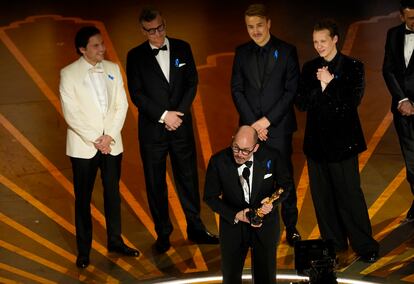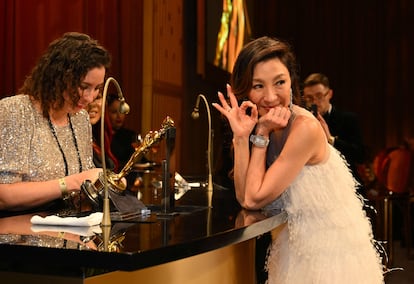Avoiding a multiverse of boredom at the Oscars
This behind-the-scenes look at Hollywood’s most glamorous night reveals how many guests retreated to the drinks bar while hosts handed awards and droned on about the importance of editing techniques


In the multiverse of the Oscars, held this past Sunday in L.A., everything was happening everywhere all at once. A radiant Cate Blanchett was so calm and collected as she sat at the most exclusive drinks bar of the Dolby theater that she had to be reminded that the moment was fast approaching to find out who the winner of the Best Actress award would be - the Oscar eventually went to Michelle Yeoh instead of Blanchett. Meanwhile, Elvis director Baz Luhrmann was asking someone to hold something that looked like a gin and tonic so he could take a selfie with two fans, in what appeared to be his way of retaining control over the scene. And Harrison Ford could be seen surreptitiously concealing the glass of whiskey in his hand, like a teenager caught by his parents, as he chatted with the young Nobel Peace Prize winner Malala Yousafzai, who was there as executive producer of a short film.
Everything Everywhere All At Once, the movie that took seven Oscars at the 95th Academy Awards, has proven to be useful for many things, including to describe the experience of seeing the ceremony play out from inside the Dolby Theater.
Beneath the glamorous and orderly appearance of the TV broadcast, the occasion looked more like a happy mess, with people constantly trekking up and down the four floors of the building to stock up on sweet, chili-flavored popcorn, while fans of the open bar made themselves right at home on the bar counter. Pretty much as soon as the beer ran out, guests began to engage in more entertaining things than following a gala hosted by comedian Jimmy Kimmel that will frankly not be remembered as the most riveting in Oscars history.
It was all very understandable. No wonder the Academy wanted an uneventful ceremony after last year’s uproar over Will Smith and how he slapped Chris Rock for making a joke about his wife Jada Pinkett Smith’s hair loss, only to later win the statuette for best leading actor.
It is also understandable that if you have just won the award for Best International Film, like the team from the German movie All Quiet on the Western Front, you immediately want to celebrate it your friends in Berlin rather than sit around while presenters open the envelope with, say, the winner of the animated short category or the so-called technical prizes, which also came with an explanation about the importance of editing in the cinematographic arts. Could it be that the ceremony scriptwriters believe that the audience does not just get smaller as the minutes go by, but also a little duller?

Risk prevention was clearly on the minds of the creators of the gala’s set design, a tribute to the old Art Deco cinemas that still live on in some US cities, with their illuminated marquees and their promise of dreams. In 2022, with the pandemic still very much a factor, those designers thought it would be a good idea to turn the place into a club with separate tables, which allowed Smith to walk purposefully and unimpeded towards Chris Rock. This year, they chose to leave the natural organization of the theater seats alone.
For everything else, they knew they could count on the seatfillers, a strange tribe of men and women who can only be seen one day a year: at the Oscars. They are hired (although they do not receive any money in return, according to two of them, Alexandra and Spencer) to be on the lookout and occupy the seats of the guests when the latter go out to talk to the press after collecting an award or to stretch their legs. Their mission is to ensure that no seats are seen to be empty when the cameras point their way. Dressed in black, their goal is to go unnoticed on a night when everyone else is going out of their way to stand out.
Public relations
It’s also a night when the stars are chilling out and, let’s not forget it, doing a lot of PR, which makes them more approachable. It was thus possible to discuss the best record stores in Los Angeles with musician Questlove, who last year won the Oscar for best documentary for Summer of Soul and this year was announcing another award; with Daniel Brühl about the novelist Erich Maria Remarque (author of the anti-war classic that inspired All Quiet on the Western Front, a film that Brühl acts in and produces). It was also possible to comment on Lady Gaga’s performance with Paul Dano, the actor from The Fabelmans, and to lament our results-oriented culture with Argentine actor Ricardo Darín (it was his way of bracing for what came to pass: Argentina, 1985 did not produce “the miracle” and left without a prize for best international film). The evening came with another discovery: that Eva Longoria is a pretty direct woman. Asked how she felt on such a special night, she replied in Spanish: “I’m hungry, I’m tired and my legs hurt.”
She also expressed her love for the Spanish city of Marbella, saying she was “excited” to debut at the Oscars. Another actress who was there for the first time was Ana de Armas, who did not fulfill her dream of winning the best actress award (for playing Marilyn Monroe in Blonde), but who celebrated the fact that there had been “so much diversity” among the winners and “so many first times.”
One of those first times featured director Steven Spielberg’s three sisters. He had never bothered to invite them to the Dolby theater before, even though Spielberg is the only filmmaker who has been nominated in six different decades. “But this year is special, because I am competing with a film [the autobiographical The Fabelmans] that is very personal. I needed a lot of courage to do it,” he said in a conversation with EL PAÍS before the gala began (and, therefore, before knowing that the award was going to Daniel Kwan and Daniel Scheinert for Everything Everywhere All At Once). Is that the same courage it takes to show up at the Dolby in a tuxedo and sneakers? “That’s not courage, it’s common sense: this day is too long.”
Not as long as it was for others, though: Spielberg was nowhere to be seen at the party that followed the gala, the Governor’s Ball, held in a large ballroom with plenty of food and even more drinks. There, the indisputable stars were the members of the Everything team, who attracted all the attention as they went through the process of customizing their Oscar statuettes.
It works like this: when you win the most coveted award in Hollywood, they give you an Oscar with no name, to which they later add a plaque with your personal information. This year, at a much livelier party than last year’s (despite the fact that the dance floor had disappeared), the normally un-glamorous act of screwing a piece of metal to a wooden base turned into a show in itself due to the infectious enthusiasm of the cast and crew of the independent film that has broken all expectations.

In the multiverse of the Governor’s Ball, Michelle Yeoh could be seen caressing her new golden best friend, Jamie Lee Curtis couldn’t conceal the excitement of feeling that she had finally reached a goal that her parents, Tony Curtis and Janet Leigh, never reached themselves, and Ke Huy Quan climbed on the tables and got up to tricks as though he had never stopped being Data, the geeky character he played in The Goonies.
To paraphrase his character in Everything..., one had the impression that each rejection, each disappointment had led the three performers to the great moment they experienced on Sunday. It was their enthusiasm that saved the Oscars from ending up as a trip to the multiverse of boredom. That, and the good will of the guests, who patiently applauded one award after another, kind of like when someone finds out that friends are organizing a surprise birthday, but still acts surprised so as not to disappoint them.
Sign up for our weekly newsletter to get more English-language news coverage from EL PAÍS USA Edition
Tu suscripción se está usando en otro dispositivo
¿Quieres añadir otro usuario a tu suscripción?
Si continúas leyendo en este dispositivo, no se podrá leer en el otro.
FlechaTu suscripción se está usando en otro dispositivo y solo puedes acceder a EL PAÍS desde un dispositivo a la vez.
Si quieres compartir tu cuenta, cambia tu suscripción a la modalidad Premium, así podrás añadir otro usuario. Cada uno accederá con su propia cuenta de email, lo que os permitirá personalizar vuestra experiencia en EL PAÍS.
¿Tienes una suscripción de empresa? Accede aquí para contratar más cuentas.
En el caso de no saber quién está usando tu cuenta, te recomendamos cambiar tu contraseña aquí.
Si decides continuar compartiendo tu cuenta, este mensaje se mostrará en tu dispositivo y en el de la otra persona que está usando tu cuenta de forma indefinida, afectando a tu experiencia de lectura. Puedes consultar aquí los términos y condiciones de la suscripción digital.








































